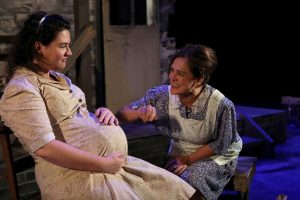The Shifting Heart
 |
| Photo by Danielle Lyonne |
White Box Theatre and Seymour Centre presents, THE SHIFTING HEART, by Richard Beynon, in the Reginald Theatre, Seymour Centre, Chippendale. 8th March – 24th March.
THE SHIFTING HEART is a revival production of an Australian play by Richard Beynon, premiered in 1957 in Sydney, that, then, under the sponsorship of the Australian Elizabethan Theatre Trust, subsequently, toured the nation and had production in the London West End in 1959. This production is part of the Reginald Program supporting Independent Theatre. The play is part of the syllabus for NSW schools.
Following the catastrophe of World War II there was an Immigration policy from the Australian Government to populate the country with Immigrants (refugees) from Europe. This saw a ‘wave’ of peoples from countries of the British Empire and Mediterranean. The Italian arrivals were part of that policy.
THE SHIFTING HEART, concerns an Italian family, the Bianchi’s, who have been resident for some 8 years in the Melbourne suburb of Collingwood, and we meet them on a hot Christmas Eve and Day. Poppa Bianchi (Tony Poli) and his wife, Momma (Dina Panozza), have worked hard and managed to buy there home whilst bringing up two children, now grown up, Maria (Ariadne Sgouros) and Gino (David Soncin).
The play examines the careless discrimination and attitudes towards these ‘new’ arrivals that sometimes escalated into violence and tragedy, abetted by the lethal indifference of authority, such as the police, represented in the play with the presence of Detective Sgt. Lukie (Lawrence Coy). We meet, from one side of the fence, white Australian neighbours: sympathetic Leila Pratt (Di Smith) and her, relatively, socially, ‘comatose’ husband, Donny (Lawrence Coy), and learn of the openly hostile other-side-of the-fence neighbours who have been a source of a kind of unspoken ‘warfare’ against these newcomers to Australia. We hear verbal references to the Bianchi family as ‘dagoes’, ‘wogs’, (which reminded me of my upbringing that also used epithets such as ‘reffos’ for my neighbours, the Vivivandi’s, an Italian market gardener family that grew potatoes, carrots and flowers [stock and poppies], next door.)
Poppa and Momma have borne social difficulties with gracious, cautious gratitude for their ‘good fortune’, for the benefit of their children. It is there, with the children, that the real heart, the shifting heart, of the story beats as we watch Maria, who has married and is pregnant to an ‘Aussie’, Clarry Fowler (Lucas Lineman), and Gino, who has proudly taken on Australian citizenship – these two generational ‘in-betweeners’, the ‘halfies’, both Italian and Australian, neither, wholly, one or the other – attempting to negotiate their way through the ‘mine-field’ of actively hostile prejudice.
The concerns of the play, written in 1957 are, alarmingly, as relevant today as it was then. True, today, it is a new and different ‘wave’ of immigrant/refugees, but the superficial attitudes of our dominant community, driven, perhaps, by deep seated fear, created by defensive ignorance, has altered little. The contemporaneous relevance of the play is stunning – excitedly, shocking.
The play has the ‘melodramatic’ structure, event and characterisation, reflective of its contextual literary period, but is no less a powerful experience, today. I speculate, that there is something almost ‘New Form’ about the experience, perhaps, for a young audience, who may have to deal in ‘real time’, for the first time, in extended naturalism, emotional conflicts of acts of physical and mental violence, that period-wise, contextually, is seen as ‘normal’, without the ease of edit, or political correct concerns to soften, censor, the edges of what they are watching.
I would, also, suggest that many in the audience may be moved to tears by the denouement experienced by the Bianchi family, at the end of this play, who have weathered such a difficult Christmas celebration, and reflect on their own personal and societal attitudes to the refugee plight in their Australia, today. I, was, both, in tears, and reflective.
Kim Hardwick, as Director, with her Designer, Isabel Hudson, abetted by The Lighting Design by Martin Kinnane have created a setting and a patina of atmosphere that is conducive to engage the audience into believing the events of THE SHIFTING HEART with an ease of imaginative conviction.
The actors are solid in their understanding and commitment to the world of the play and the importance of what they are telling. Dina Panozzo especially zestful in her organic creation of the complex shifts and changes of Momma Bianchi, whilst, Di Smith is mordantly witty in her characterisation of the woman, Leila, experiencing the burden and traditions of a marriage of the period, who is still aching with a generosity of goodness that, surprisingly, has not being worn away to bitterness.
This production of THE SHIFTING HEART, is a more than enjoyable storytelling experience that has a deep and evident relevance for us all. A ‘Classic’ piece of Australian writing that will resonate with all who get to see it. I recommend that you do.